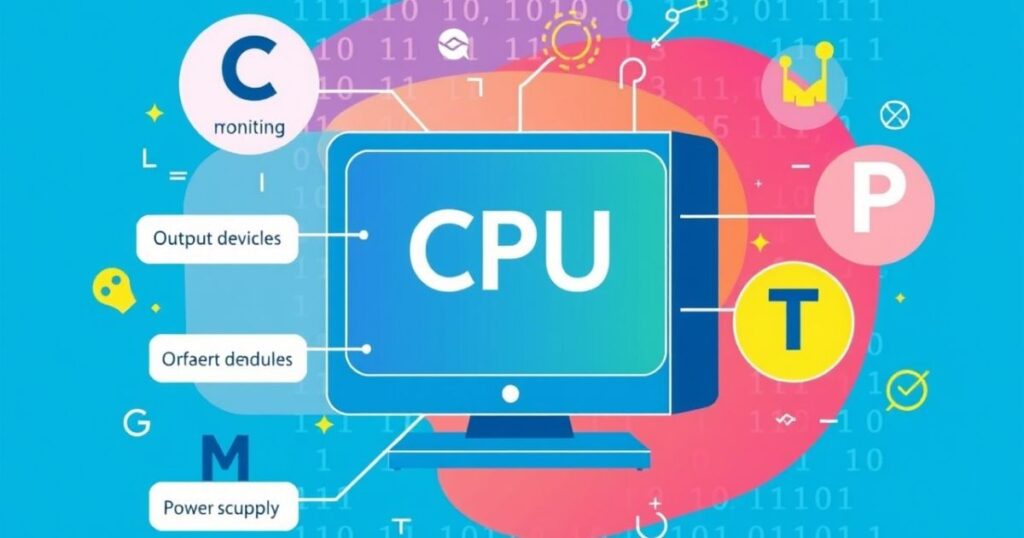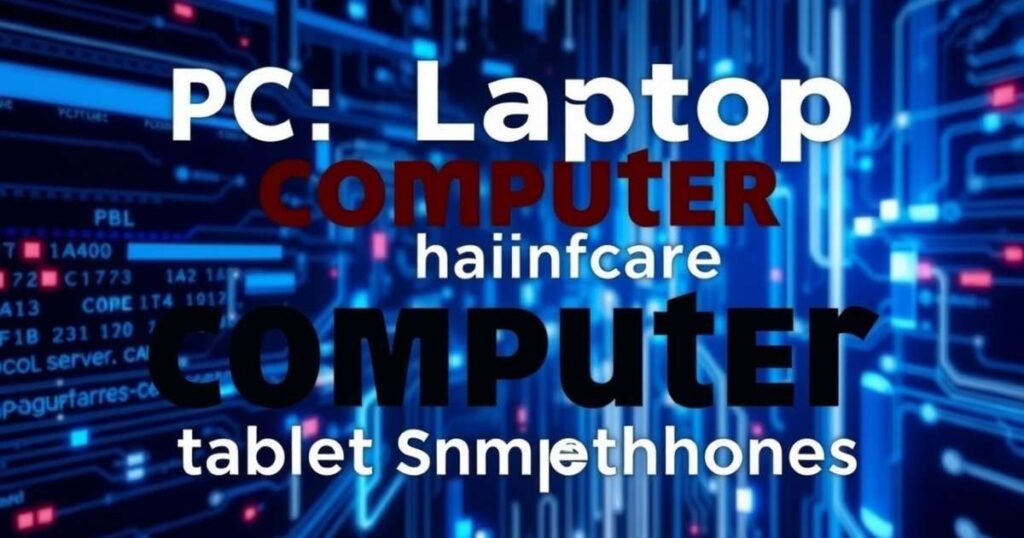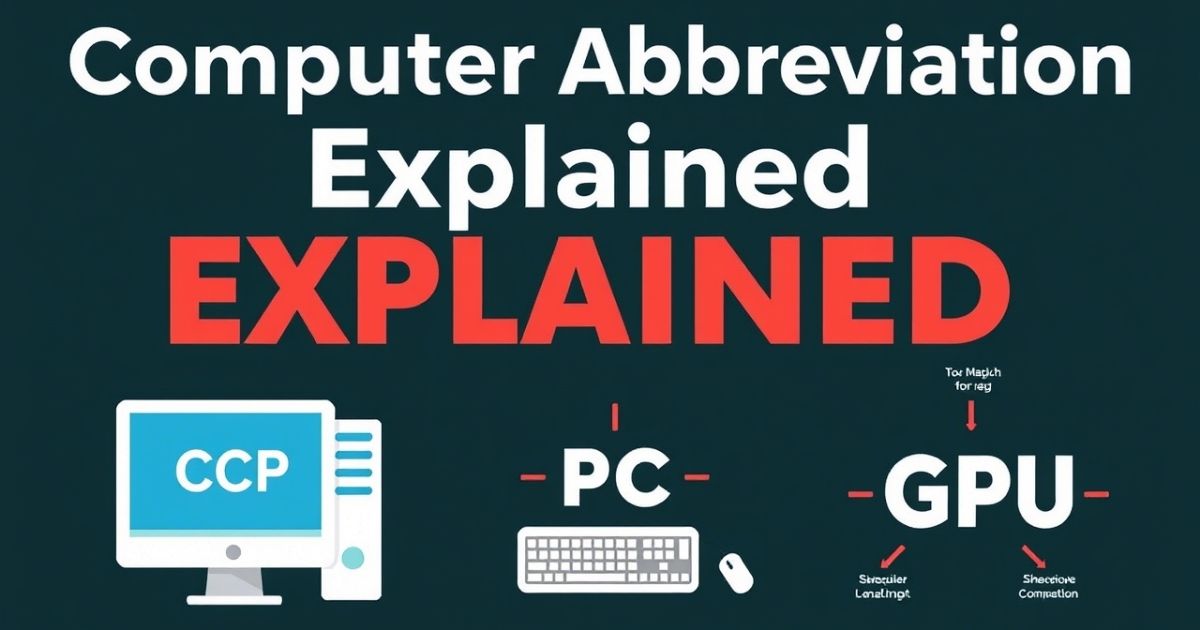The abbreviation for computer is often used in casual settings to save time. While there isn’t a widely accepted official abbreviation for “computer,” the term “comp” is commonly used as a short form. This abbreviation for computer helps people quickly refer to their machines in everyday conversations. It’s important to note that this abbreviation for computer is informal and not typically seen in professional or technical writing.
In the world of tech, there are many abbreviations of computer terms. For example, “PC” stands for Personal Computer, and “CPU” refers to the Central Processing Unit. These basic abbreviations in computer language make it easier to talk about various computer components. Whether you’re using a computer abbreviation in a casual chat or a technical discussion, these shortcuts are helpful in simplifying complex terms. The abbreviation of computer and other terms like it make tech conversations faster and more efficient.
Abbreviation for Computer
The word “computer” doesn’t have a widely accepted abbreviation and is generally used in its full form.
However, in certain contexts, abbreviations or acronyms related to specific types of computers or computing concepts may be used, such as:
- PC for “Personal Computer”
- CPU for “Central Processing Unit”
- RAM for “Random Access Memory”
- IT for “Information Technology”
That said, the word “computer” itself is not typically abbreviated.
What is the abbreviation for Computer?

While the word “computer” is typically not abbreviated in formal contexts, it is occasionally shortened to “Comp” in casual or informal settings.
This abbreviation is a quick and convenient way to refer to a computer, particularly in text messages, notes, or casual conversations.
For example, someone might say, “I need to fix my comp” or “The comp crashed during the meeting.”
However, “Comp” isn’t universally recognized or standardized, so it’s mainly used in informal situations. For formal writing or technical documents, it’s best to use the full word “computer” to avoid confusion.
What Does Computer Mean?
A computer is an electronic device designed to process and store data, performing tasks like calculations, data manipulation, and executing programs. It consists of hardware and software working together to enable users to perform various functions, from simple tasks to complex computations.
The abbreviation for computer is not commonly used in formal contexts. While “comp” may be seen in informal settings as a shorthand, it is not widely recognized or standardized, and the full word is preferred in professional and technical writing.
Why Doesn’t “Computer” Have a Standard Abbreviation?
The word “computer” doesn’t have a standard abbreviation because clarity is essential, especially in professional and technical contexts. Using the full term helps avoid any potential confusion or misinterpretation, ensuring the meaning is universally understood.
As technology continues to evolve, the terminology associated with it remains simple and widely recognized. Unlike more complex terms, such as “RAM” or “HTML,” the word “computer” is already brief enough to be used in full without causing any communication issues.
There isn’t a widely recognized abbreviation for computer, unlike other technology-related terms that have become abbreviations over time. For example, “PC” for “Personal Computer” or “IT” for “Information Technology” are both commonly used and understood, but “computer” remains unaffected by the trend.
In informal settings, some people may shorten “computer” to “comp,” but this isn’t a standardized or widely accepted abbreviation. While it may be convenient for casual conversations, it’s not suitable for formal or technical contexts, where the full term is preferred.
In professional writing or technical documents, it’s important to use precise and clear language. The word “computer” is simple enough not to require abbreviation, and using it in full avoids any ambiguity that could arise from a non-standard short form like “comp.”
The word “computer” itself is short and easy to understand, so there is little need for an abbreviation. While related terms like “CPU” and “RAM” have developed abbreviations for convenience, abbreviation for computer hasn’t been necessary due to the word’s brevity and universal familiarity.
Popular Terms Related to Computers and Their Abbreviations
- PC : Personal Computer
A PC refers to a computer designed for use by an individual, typically for general tasks such as browsing, working, and entertainment. It’s the most common type of computer found in households and offices. - CPU : Central Processing Unit
The CPU is often called the “brain” of the computer. It performs most of the processing inside a computer by executing instructions from programs and controlling other components. - RAM : Random Access Memory
RAM is the temporary storage used by computers to store data that is actively being used or processed. The more RAM a computer has, the more applications it can run simultaneously without slowing down. - ROM : Read-Only Memory
ROM is a type of non-volatile memory that stores critical system information, including firmware. Unlike RAM, the data in ROM is not lost when the computer is powered off. - USB : Universal Serial Bus
A USB is a standard for connecting peripherals, such as keyboards, mice, and storage devices, to a computer. It allows for quick data transfer and is widely used for external devices. - IP : Internet Protocol
The IP is a set of rules that governs how data is sent and received over the internet. Each device on a network is assigned a unique IP address to identify it.
A Fun Mnemonic: C.O.M.P.U.T.E.R.
A fun mnemonic can be a creative way to remember the abbreviation for computer. For example, “C.O.M.P.U.T.E.R.” could stand for “Creative Operators Making Practical Use of Technology Efficiently and Responsibly.” This helps make learning more engaging and memorable.
Although abbreviation for computer itself doesn’t have a widely accepted shortcut, using mnemonics like this can aid in remembering related concepts. It’s a playful approach that connects each letter to important aspects of technology.
While informal abbreviations like “Comp” are sometimes used, they’re not as universal or standard. The full word “computer” is preferred for formal and technical contexts to avoid any confusion.
Related Guide:
Abbreviation for Transport: Meaning & Examples
Acronym for Computer: Does it Exist?
The word “computer” does not have an official acronym. In most cases, the full word is used to maintain clarity, especially in formal and technical contexts.
While “computer” is generally not abbreviated, in informal contexts, some people use “comp” to quickly refer to it. This is more common in casual conversations or text messages.
Though “computer” itself isn’t abbreviated, related terms like PC (Personal Computer) or CPU (Central Processing Unit) are widely used. These acronyms are more standardized and recognized in both professional and casual settings.
Full-Form for Computer: A Fun Fact
The term “computer” doesn’t actually have a single, official full form. However, a fun fact is that the word “computer” originally referred to a person, not a machine! In the past, a “computer” was a human who performed mathematical calculations or computations, often with the help of a calculator.
Over time, the meaning of the word evolved to refer to the machines we use today. The shift happened as technology advanced and machines began to take over the computational tasks previously handled by humans.
How to Pronounce Abbreviation for Computer Computer
The abbreviation for “computer” is typically “comp” (pronounced as “komp”). It’s a simple, informal shorthand for the full word “computer.”
- Comp: Pronounced like “komp,” rhyming with “chomp.”
While “comp” is commonly used in casual conversations, it’s important to note that it’s not widely recognized in formal settings. For professional or technical contexts, it’s best to use the full word “computer” (pronounced as “kom-PEW-ter”).
Other Examples: Abbreviations in Tech
In the tech world, abbreviations like “Comp” for “computer” are just the beginning of how we simplify language. Shortening terms makes communication quicker and more efficient, especially in fast-paced environments.
For example, “App” is commonly used for “application”, and “Net” is a shorthand for “internet”. These abbreviations help professionals and everyday users keep up with the rapid pace of technological advances.
This flexibility in language allows us to stay connected and engaged in the ever-evolving tech landscape, where speed and clarity are crucial for effective communication.
Synonyms for “Computer”

- PC : Personal Computer
- Workstation : A powerful computer used for professional tasks
- Laptop : A portable computer
- Desktop : A stationary computer
- Machine : Informal term for a computer
- Terminal : A device used to interact with a larger computer system
- Device : A general term for electronic gadgets like computers
- System : Referring to a complete computing system
Antonyms for “Computer”
- Pen and Paper : Traditional manual tools for writing and computation
- Typewriter : A mechanical device used for typing before computers
- Abacus : An ancient tool used for arithmetic calculations
- Calculator : A device used for simple mathematical calculations
- Human Brain : In some contexts, referring to manual computation done by a person instead of a machine.
The History of the Word Computer
The word “computer” originally referred to a person who performed mathematical calculations by hand or using a mechanical device. These early “computers” played a crucial role in tasks like astronomy and navigation.
As technology progressed, the focus shifted from humans to machines. By the 20th century, the term “computer” became associated with electronic devices capable of processing data, revolutionizing industries and daily life.
When to Use the Abbreviation for Computer

While “computer” is rarely abbreviated in formal contexts, using “comp” can be appropriate in casual settings. It’s a quick shorthand for informal conversations or text messages.
The key factor in using an abbreviation like “comp” is the context. In professional or technical writing, always use the full word “computer” to ensure clarity and precision.
Since “comp” is not universally recognized, avoid using it in formal documents, emails, or presentations. Focus on clarity and opt for the full term to prevent confusion.
Example of the Word and Abbreviation in Context
Example of the Word “Computer” in Context
I spent the entire afternoon working on my computer to finish the project. It’s crucial to have the right software installed for the task.
Example of the Abbreviation “Comp” in Context
Can you check the comp to see if the new program is working? I think I left my comp at the office after the meeting.
FAQ’s
What is the most common abbreviation for computer?
In casual settings, people often shorten the word “computer” to comp. It’s a simple and quick abbreviation for computer used in informal conversations.
Why do we use abbreviations in the tech world?
Abbreviations make communication faster and easier. The abbreviation for computer helps simplify complex discussions, especially when talking about devices in everyday conversations.
How can abbreviations help in technical communication?
In technical fields, abbreviations like comp are used to save time. The abbreviation for computer helps professionals discuss various aspects of tech efficiently.
Is it okay to use abbreviations for computer in formal writing?
While informal settings often use the abbreviation for computer, it’s best to avoid it in formal writing. Clarity is important in professional contexts.
Are there other abbreviations related to computers?
Yes, there are many abbreviations for tech terms, like PC for Personal Computer. The abbreviation for computer helps make conversations quicker and more efficient.
Conclusion
The abbreviation for computer plays a helpful role in everyday conversations, especially when referring to technology in a simpler, quicker way. While the abbreviation for computer isn’t universally standardized, terms like “comp” and other computer abbreviation shortcuts are commonly used informally. It’s important to know when it’s appropriate to use these abbreviations of computer terms, as they are more suitable in casual settings rather than formal or technical contexts.
Many basic abbreviations in computer language, such as “PC” for Personal Computer or “CPU” for Central Processing Unit, are essential in tech discussions. Understanding the abbreviation of computer terms, as well as others related to technology, helps streamline communication. By using these computer abbreviations, you make it easier to discuss complex topics in a shorter and more efficient manner, ensuring smoother conversations in both professional and casual environments.

Atlas Reid is an experienced administrator with 5 years of expertise in managing operations, streamlining processes, and ensuring efficiency. Skilled in leadership, organization, and problem-solving to drive business success.








